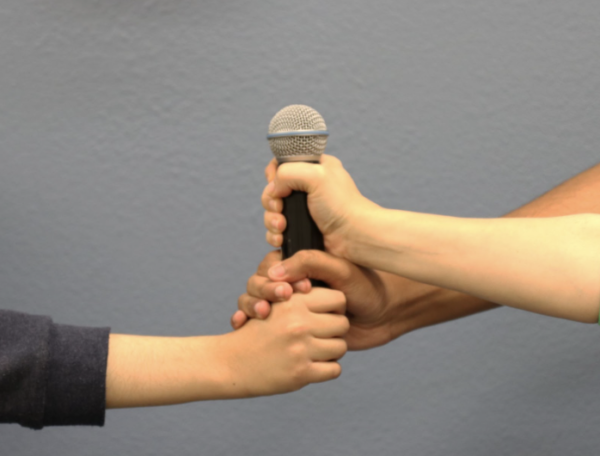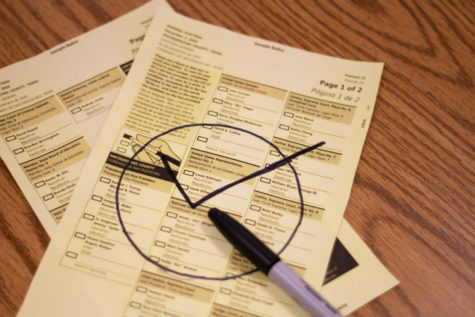Staff Editorial: It’s OK to not be OK
Prioritizing mental health struggles is imperative
Over 60% of individuals will experience a traumatic event before the age of 16.
Whether that particular event is witnessing childhood friends move away, a loved one passing or something as severe as abuse, trauma presents itself in different forms. This student body has experienced the struggles of isolation during quarantine, digital learning and this year, the loss of peers. While some people can easily find healthy coping mechanisms, teenagers often struggle to find proactive methods of dealing with emotional turmoil. It is imperative for teenagers to prioritize their own mental health and recognize the warning signs of self-destructive behavior.
Teenage years are a pivotal time of emotional development. When dealing with severe forms of trauma, such as experiencing school shootings, substance addiction or peers passing away, at such a critical point in the brain’s maturation, teenagers often resort to unhealthy coping mechanisms in order to distract themselves from reality. Significant changes in academic performance, hypersexuality, substance abuse and suicidal thoughts are the most prominent symptoms of self-destructive behavior. This type of behavior stems from unresolved trauma and, in turn, creates unhealthy coping mechanisms. Remaining vigilant of the warning signs from unhealthy coping mechanisms in both loved ones and peers is the first, and perhaps most important, step toward rehabilitation.
The feeling of isolation can overpower any other emotion for a person going through emotional turmoil; it may feel as though nobody understands the depth of their issues. In the midst of struggle, another person reaching out their hand to help, providing a light at the end of the tunnel, can be a positive focal moment in anybody’s life, and may change the trajectory of their struggle with mental health. A simple “how are you?” to a loved one or even a stranger who sits beside you in class can, at times, lead to a vulnerable conversation about how they are truly feeling.
Mental health is different for everybody, much less the struggles that may come with it. Treatment options can vary for individuals who are struggling. There are a plethora of alternative solutions, besides traditional psychotherapy, to begin healing trauma. These include listening to mental health awareness podcasts, coping through religion, using meditation apps, reading self-help books and attending local support groups. Utilizing any of these positive coping methods can create connections to others with similar troubles and introduce the idea to a person that they are not alone in their struggles.
Starting the conversation about mental illness and seeking help can be uncomfortable. Common stereotypes for those affected by mental illness are that they are “crazy,” “sensitive” and “broken.” Some may even be subjected to discrimination, such as fewer job opportunities and lower healthcare options. But it is our societal duty to look out for those around us when it comes to serious topics such as mental health struggles – nobody can truly fight their problems alone. As social media paves the way toward mental health awareness, society must follow suit in destigmatizing individuals with mental disorders who are simply trying their best to create a sense of normality for themselves.
Identifying that a person’s mental health is deteriorating is an extremely challenging task due to some individuals being better at hiding indications than others, but it is still necessary to remain alert. Confide in a trusted adult if it feels as though a person’s mental health crisis has escalated and their physical safety is in danger. Suicide is the third leading cause of death in teenagers – a teen passes away due to suicide every 11 minutes — a horrifying, yet real statistic. A reality check that some need to understand is the importance of prioritizing mental health in ourselves and checking up on others, even if it may frustrate someone currently battling with mental illness to feel as though people around them are “overbearing.” It’s better to have a friend who is still alive and angry at you for overstepping than to have to grieve their loss and experience the guilt that comes with it.
It is vital that teenagers stick together, lift each other up and look out for one another during periods of stress and trauma. All teenagers are growing at their own pace, conquering relentless drama and frenzies of hormones. There are paths to recovery readily available – all it takes is acceptance and empathy from others to truly begin healing.
If you or someone you know is in crisis, there are resources to help. You are not alone.
Suicide and Crisis Hotline – 988
National Suicide Prevention Lifeline – 800-273-8255
National Substance Abuse and Mental Health Hotline – 800-662-4357

Senior Caleb Wright is the sports editor and this is his third year on staff. He enjoys driving his 2011 Volkswagen and studying investing and trading.













